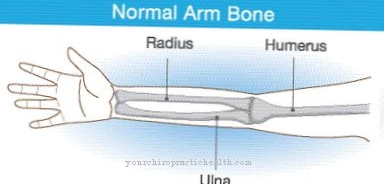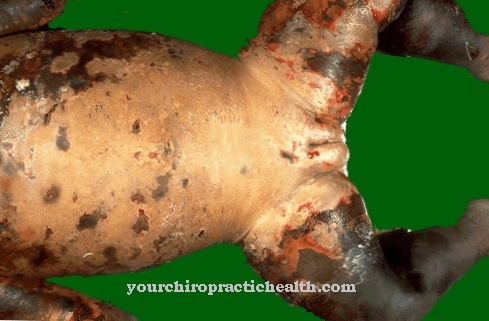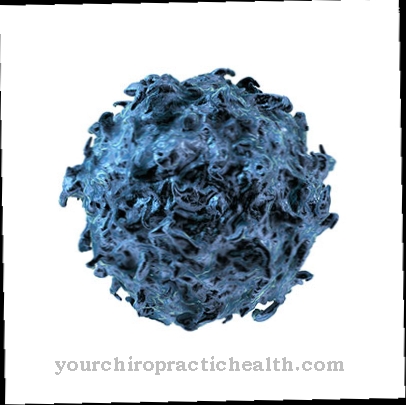The Hypersensitivity to noise (medical term: Hyperacusis) is a very unpleasant acoustic disturbance in which those affected perceive noises of normal volume as very loud and difficult to bear. In the following, the disorder is described in more detail and possible causes and therapeutic approaches are mentioned.
What is noise hypersensitivity?

Hyperakusis is a Latin word and is made up of the parts "hyper" (over) and "akuo" (I hear). People who suffer from hyperacusis perceive noises with normal or, in extreme cases, even low noise levels as very loud.
This mainly applies to volume levels between 50-80 db. You perceive the volume as very uncomfortable and in many cases also react physically, for example by grimacing or wincing - the stronger the volume, the higher the volume is above your tolerance limit. Then symptoms such as palpitations or sweating are common.
The hypersensitivity is not limited to individual noises, rather noise such as traffic noises or music from the neighboring apartment is perceived as unpleasant across the board. The diseased ears are no longer able to block out background noises such as traffic noise or the neighbour's vacuum cleaner; the burden on those affected is enormous.
causes
Unfortunately, too little research has been done on hyperacusis to be able to make really reliable statements about the causes. However, it has been observed that hyperacusis often occurs in conjunction with or after a time delayed tinnitus.
Hyperacusis often occurs with other physical and mental illnesses - for example in connection with a traumatic brain injury, a migraine, epilepsy, a Lyme disease infection or with multiple sclerosis, or in connection with depression, PTSD (post-traumatic stress disorder) or a mania.
Sometimes the so-called "recruitment", which occurs in people who are hard of hearing and whose hair cells in the inner ear are damaged and who are hypersensitive to loud noises, is also known as hyperacusis. Once noises have reached the hearing threshold, the increase in volume level is perceived much more rapidly from this point than by the non-hearing impaired; However, one speaks of hyperacusis in the medically correct sense only when the hearing threshold is normal.
Symptoms, ailments & signs
People who are hypersensitive to noise perceive everyday noises as being particularly loud. Normal noises such as footsteps or knocking are perceived as very unpleasant and can sometimes lead to physical reactions. In addition to the hypersensitivity to noises, other symptoms can occur, such as palpitations, high blood pressure or sweating.
Many patients are easily irritable, tense and suffer from inner restlessness. Especially in stressful phases of life and situations, there are more panic attacks and severe discomfort. As a result, those affected often withdraw from social life, which can lead to depressive moods and other psychological complaints. The complaints usually appear insidious and are not always noticed immediately by those affected or are attributed to sensitivity to noise.
Sensitivity to noise rarely occurs in childhood. Sometimes the symptoms go away on their own after a while. However, they can persist for months, years or even the entire life of the person concerned. Chronic oversensitivity to noise usually occurs in connection with other psychological complaints and increases in intensity over time. If the hypersensitivity to noise is based on tinnitus, ringing in the ears and other symptoms are often added.
Diagnosis & course
Since noises with a volume that the average population perceives as normal or low cause severe problems in those affected, the main danger with this disease is that they can no longer actively participate in everyday life.
Loud parties are perceived as unbearable agony; Festive occasions, where the noise level usually rises with increasing alcohol consumption, are deliberately avoided. There is a risk of isolation, which of course increases when those affected no longer dare to go out on the street or to work because of the daily noise, for example from traffic.
This behavior can be intensified by learning the pleasant silence at home as a basic state and the everyday noises of the outside world as an unpleasant state. Retreating into their own four walls leads to the social isolation of those affected. The diagnosis of hyperacusis is made by the doctor after extensive hearing tests and an examination of the ear, nose and throat area.
Complications
The hypersensitivity to noise results in considerable restrictions in everyday life and the patient's quality of life is extremely reduced. It is not only the psychological perception, but also the physical function of the disease that is affected. In most cases, high blood pressure and a racing heart occur.
In the worst case scenario, death can result if the heart complaint is not treated properly. The person concerned often appears tense, aggressive and irritable. Ordinary participation in active life is no longer possible. Sleep disorders also occur, which can have a negative effect on the patient's ability to concentrate.
In stressful situations, panic attacks or sweating can occur. It is not uncommon for the patient's social contacts to be restricted due to the sensitivity to noise and those affected to withdraw. This can lead to depression and other mental health problems.
A causal treatment of hypersensitivity to noise is not possible. However, hearing aids can be used that minimize the noise and thus alleviate the symptoms. In some cases, the disease will go away on its own over time. Often, however, the patient has to spend his entire life with hypersensitivity to noise.
When should you go to the doctor?
A doctor's visit is necessary as soon as everyday ambient noise is perceived as disturbing. Regardless of the intensity of the impairment or the sensitivity, a doctor should be visited to clarify the cause. Even with minor complaints, a doctor should be reported about the perceptions, as serious illnesses can be concealed behind them. If the sensitivity to noise increases, a doctor's visit is required as soon as possible.
If there are also noises in the ears or if the person concerned notices a temporary numbness in the ear, a doctor should be asked for advice. If you hear a whistling or beeping sound in your ear, you should consult a doctor immediately. If the person concerned complains of a mood swings, inner restlessness or irritability due to the sensitivity to noise, a doctor is needed. If changes in behavior occur, if the experience of stress increases or if there is social withdrawal, a doctor should be consulted. If everyday obligations in work or private life can no longer be fulfilled, a doctor should be consulted.
In the case of headaches, sleep disorders, concentration and attention deficits, the consultation of a doctor is necessary. Elevated body temperature, sweats, unsteady gait, and dizziness should be examined and treated by a doctor. If dizziness, nausea, or vomiting occurs, a doctor's visit is required. Consult a doctor if you lose your balance, experience pain or a feeling of pressure in the area of the ears.
Doctors & therapists in your area
Treatment & Therapy
Unfortunately, when treating hyperacusis, it is not possible to work on a solid medical foundation. However, there are a variety of therapies that have helped sufferers. The therapeutic approaches are therefore very different and individual.
In mild cases, "relieving" noise is sometimes sufficient so that the ear can get used to a normal assessment of volume levels again.
In other cases, the treatment takes place through the use of so-called "noisers", in English sound generators, which are reminiscent of hearing aids and which ensure a steady background noise that can be gradually increased. In this way, the ear should learn to successfully block out environmental noises again.
In cases in which the hyperacusis occurs in connection with another disease, successful therapy for this disease often also brings the hyperacusis to an end.
Outlook & forecast
If the sensitivity to noise is triggered by an emotional problem, there is a good chance of a cure. Cognitive training can train perception and regulate the strength of the influencing factors. In many cases the person concerned has been conditioned to certain areas based on a learning experience. This can be changed or deleted in therapy through targeted exercises.
In the case of a mental disorder, hypersensitivity to noise is usually not specifically treated. In the case of depression, trauma or fear, the triggering cause is researched and worked on in cooperation with the patient. The chance of recovery increases as soon as the person concerned actively cooperates and is interested in a change in their living conditions.
If the patient decides not to seek therapeutic or medical help, it is usually difficult to alleviate the symptoms. If organic disorders can be excluded, there is the possibility of an independent healing. If the patient has enough experience, he can achieve a minimization of the symptoms.
If the sensitivity to noise is the result of an infection or other illness, the symptoms can be improved by using a hearing aid or by administering dampening medication. Permanent recovery occurs once the underlying disease is diagnosed and treated.
prevention
Not much has been found out about prevention either. Actions similar to those used for tinnitus prevention may need to be taken. In general, better education about the phenomenon of hyperacusis will result in faster diagnosis and treatment of the disease. In this way, those affected can be better understood, instead of just being labeled as oversensitive, and they then know for themselves that they can be successfully treated for hyperacusis.
Aftercare
Follow-up care is not always necessary if the patient is temporarily over-sensitive to noise. It can be nervous and occur as a result of stress. It may be advisable to move if the person concerned lives in a busy and noisy area. The noise level in some parts of the city can be considerable.
However, if the oversensitivity to noise is due to a hearing problem or is the result of high sensitivity, the procedure may be different. Highly sensitive people have only limited opportunities to turn off their sensitivity to noise. You should therefore make your life as stress-free as possible.
For hearing problems caused by hypersensitivities, acousticians or ENT doctors are the contact persons. Hyperacusis as a result of tinnitus can also be improved with clinical treatment. If the hyperacusis occurs as a result of tinnitus or a traumatic experience such as a bomb explosion, relaxation therapies or listening training can help to regain a normal relationship to the general volume.
Hyperacusis can arise as a result of an exhaustion syndrome or burnout, as well as a [[Posttraumatic Stress Disorder (PTSD) posttraumatic stress syndrome or a blast trauma. With the latter two, stress relief and trauma treatment are in the foreground of every aftercare measure.
Follow-up care is more extensive for the first two diseases mentioned. It can be tedious and require changes in life. After the acute clinical treatment, follow-up care is usually provided by the family doctor. Psychotherapeutic support for all those affected can be advisable.
You can do that yourself
Due to the relatively high level of suffering and the impairment in social situations, the family doctor should be consulted as early as possible to clarify further treatment. In addition, the family doctor can refer those affected to specialists if necessary.
The otoscope enables the ENT doctor to recognize the disturbance in the ear or to rule out damage in the ear area as a cause of the disturbance. The neurologist, in turn, can diagnose the disease through a blood count or an MRI.
If the disorder has psychological causes, the disorder should be addressed psychologically within the framework of psychotherapy and / or medication, so that the basis for the hypersensitivity to noise is removed. Is z. If, for example, fear is the cause of the disorder, the psychologist can help fight the cause of the fear and help the person concerned to regain more courage and self-confidence.
The person concerned can also help himself through meditation, so that he learns through relaxation to come to rest again and to reduce his nervousness. Accompanying music can be useful for the person concerned in his meditation exercises to get in the right mood. The music should be relaxing and follow a calm and steady rhythm so that it can be completely absorbed in the music.

.jpg)






















.jpg)



